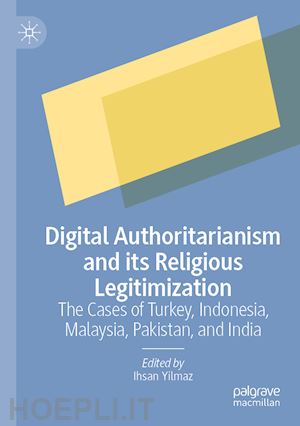

Questo prodotto usufruisce delle SPEDIZIONI GRATIS
selezionando l'opzione Corriere Veloce in fase di ordine.
Pagabile anche con Carta della cultura giovani e del merito, 18App Bonus Cultura e Carta del Docente
This book explores how digital authoritarianism operates in India, Pakistan, Turkey, Indonesia, and Malaysia, and how religion can be used to legitimize digital authoritarianism within democracies. In doing so, it explains how digital authoritarianism operates at various technological levels including sub-network level, proxy level, and user level, and elaborates on how governments seek to control cyberspace and social media.
In each of these states, governments, in an effort to prolong – or even make permanent – their rule, seek to eliminate freedom of expression on the internet, punish dissidents, and spread pro-state propaganda. At the same time, they instrumentalize religion to justify and legitimize digital authoritarianism. Governments in these five countries, to varying degrees and at times using different methods, censor the internet, but also use digital technology to generate public support for their policies, key political figures, and at times their worldview or ideology. They also, and again to varying degrees, use digital technology to demonize religious and ethnic minorities, opposition parties, and political dissidents.An understanding of these aspects would help scholars and the public understand both the technical and social aspects of digital authoritarianism in these five countries.
Ihsan Yilmaz is Research Professor and Chair at the Alfred Deakin Institute for Citizenship and Globalisation, Deakin University, Melbourne, Australia. He is also a Non-Resident Senior Fellow at Oxford University’s Regent College and the European Center for Populism Studies, Brussels. Previously, he worked at the Universities of Oxford and London and has a strong track record of leading multi-site international research projects funded by the Australian Research Council, Victorian and Australian Governments, and Gerda Henkel Foundation. He has been working on authoritarianism, digital authoritarianism, populism, religion and politics with special emphasis on Turkey, Indonesia and Pakistan, and Muslim diasporas in the West.











Il sito utilizza cookie ed altri strumenti di tracciamento che raccolgono informazioni dal dispositivo dell’utente. Oltre ai cookie tecnici ed analitici aggregati, strettamente necessari per il funzionamento di questo sito web, previo consenso dell’utente possono essere installati cookie di profilazione e marketing e cookie dei social media. Cliccando su “Accetto tutti i cookie” saranno attivate tutte le categorie di cookie. Per accettare solo deterninate categorie di cookie, cliccare invece su “Impostazioni cookie”. Chiudendo il banner o continuando a navigare saranno installati solo cookie tecnici. Per maggiori dettagli, consultare la Cookie Policy.